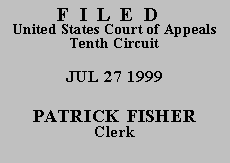

| FABIAN MORGAN,
Petitioner-Appellee,
v.
RONALD LYTLE, Warden;
ATTORNEY GENERAL FOR THE
STATE OF NEW MEXICO, Respondents-Appellants. |
No. 98-2108
(D.C. No. CIV-96-1368-SC) |
The state appeals the district court's grant of Fabian Morgan's petition for writ of habeas corpus. The court ordered Mr. Morgan's release from custody after finding a double jeopardy violation because Mr. Morgan was tried and convicted for a criminal transaction on which the state previously had levied and collected a criminal tax penalty. The state contends there was no proof the tax was ever collected. For the reasons given below, we affirm.
The first state action in this double jeopardy case began in March 1993 when the New Mexico Taxation and Revenue Department assessed against Mr. Morgan a controlled substance tax of $207.50 for the sale of one gram of cocaine. In July 1993, Mr. Morgan was tried and convicted in New Mexico state court for trafficking cocaine based on the same transaction for which he had been taxed. He was sentenced to thirteen years of incarceration.
Mr. Morgan filed this action pursuant to 28 U.S.C. § 2254 seeking his release on double jeopardy grounds. With his pro se motion for summary judgment, Mr. Morgan filed an affidavit asserting that the state collected the controlled substance tax from him by seizing his state tax refund in April 1993. Rec., vol. I, doc. 17. He also submitted to the district court a statement of undisputed facts which included the fact that the tax had been collected from his state tax refund. Id. at doc. 19. The state never contested this asserted fact.
In the Proposed Findings and Recommended Disposition, the magistrate judge noted that "Petitioner asserts that his conviction constitutes double jeopardy because it followed the imposition and collection of a punitive tax assessment." Rec., vol. I, doc. 30, at 2. The magistrate judge thereafter concluded in paragraph 16:
In this case, [Mr. Morgan] was subjected to a monetary penalty under the Controlled Substance Tax before he was tried and convicted on the charges which form the basis of his present confinement. Petitioner was twice placed in jeopardy by his criminal trial. Therefore, his petition for writ of habeas corpus must be granted on the second ground for relief presented.
Id. at 9 (emphasis added).
In the state's objections to the magistrate judge's proposed findings, the state did not object to the fact that the tax had been collected. Indeed, the state's objection to paragraph 16 was silent as to the issue of tax payment, stating: "Respondent disagrees with the finding that, 'Petitioner was twice placed in jeopardy by his criminal trial. Therefore, his petition for writ of habeas corpus must be granted on the second ground for relief presented.'" Rec., vol. I, doc. 32, at 2. Adopting the magistrate judge's findings and recommendation after a de novo review of the record, the district court granted the writ of habeas corpus and ordered Mr. Morgan's release.
Subsequent to the district court's order, the state filed a motion to reconsider and submitted an accompanying brief in which it again failed to mention the issue of tax payment. The issue was not raised until the district court held a hearing on the motion to reconsider, at which point the court held the argument waived. See Rec., vol. II, at 14.
On appeal, the state admits that "[i]f the actual tax was paid, [we] concede a double jeopardy violation occurred and the writ was properly granted." Aplt. Br. at 10. However, the state asserts the record below fails to support the contention that in fact Mr. Morgan paid the tax. The state argues that no definitive evidence was offered by Mr. Morgan showing the tax was paid, and therefore the case should be remanded for further evidentiary exploration.
"This circuit has adopted a firm waiver rule under which a party who fails to make timely objection to the magistrate's findings and recommendations waives appellate review of both factual and legal questions." Talley v. Hesse, 91 F.3d 1411, 1412 (10th Cir.1996); see also Frontier Refining Inc. v. Gorman-Rupp Co., 136 F.3d 695, 706 (10th Cir.1998). There is an exception "when the ends of justice dictate otherwise or when the magistrate's order does not clearly apprise a pro se litigant of the consequences of a failure to object." Talley, 91 F.3d at 1413; see also Moore v. United States, 950 F.2d 656, 659 (10th Cir.1991).
In the instant case, the state's objections to the magistrate judge's findings did not include an objection to the statement that the tax had been collected. We agree with the district court that the state waived this argument. Moreover, even now the state does not contend the tax was not paid; it only speculates it might not have been and that an evidentiary exploration might be helpful. We are not persuaded the ends of justice would be served by indulging the state's further extension of these proceedings.
After review of the entire record, we conclude that the state has failed to establish sufficient grounds for reversal. We therefore AFFIRM the district court.
ENTERED FOR THE COURT
Stephanie K. Seymour
Chief Judge
*.This order and judgment is not binding precedent, except under the doctrines of law of the case, res judicata, and collateral estoppel. The court generally disfavors the citation of orders and judgments; nevertheless, an order and judgment may be cited under the terms and conditions of 10th Cir. R. 36.3.